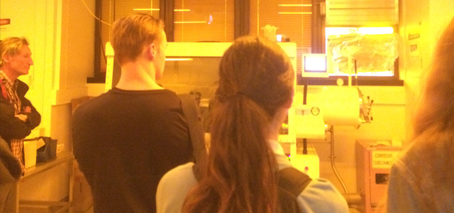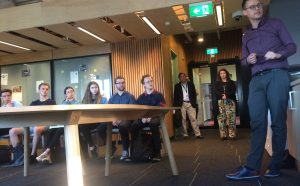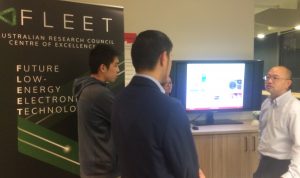FLEET’s RMIT labs recently hosted a tour by members of the Victorian branch of the Australian Institute of Physics, the country’s leading body for physics advocacy and support.
The tour included the experimental laboratories and a briefing by RMIT node leader Prof Lan Wang, and AI Torben Daeneke, covering the research topics in Lan Wang’s group, Jared Cole’s group, JianZhen Ou’s group and Torben Daeneke’s group.
Lan Wang talked about the fabrication van der Waals heterostructures and the topological and spin devices based on these heterostructures in his group. He also gave a brief of the theoretical works in Jared Cole’s group.
Torben gave an introduction of the fabrication of nano-sensors based on 2D materials in Jianzhen’s group and the novel techniques of fabricating 2D materials using liquid metal in his group.
Experimental laboratory tours included:
- The FLEET electronics lab in which Professor Lan Wang leads investigations of electron and spin transport in various stacked van-der-Waals heterostructures using low-temperature, high magnetic field systems.
- FLEET optics lab where Professor Wang’s group is establishing a Magneto-Optic Kerr Effect (MOKE) system to investigate 2D ferromagnetism, and a photon-current system to investigate the photon current effect. Dr Jian zhen Ou and Dr Torben Daeneke are investigating plasmonics in 2D materials using scanning near-field optical microscopy (SNOM).
- The RMIT Microscopy and Microanalysis Facility, which is where all of FLEET’s nanodevices are fabricated using high-quality electron microscopy and microanalysis equipment including Scanning Electron Microscopes (SEMs) and Transmission Electron Microscopes (TEMs) that can magnify up to 10 million times, sufficient to see atomic structure.
For FLEET, it was a very welcome opportunity to talk to physicists about the research that we’re undertaking, and to show enthusiasts around the excellent RMIT lab facilities. The Centre is always seeking opportunities to engage with industry, science or other professional bodies. If your group would like to hear about FLEET’s search for ultra-low energy electronics, please contact Errol Hunt or Dianne Ruka.
Thanks to the AIP, in particular Geoff Cousland and Anton Tadich, who helped facilitate the visit.



